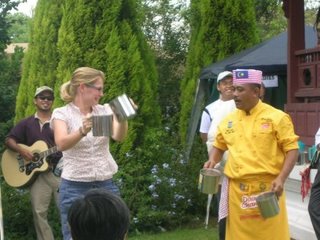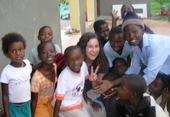Saturday, November 25, 2006
Friday, November 24, 2006
Thanksgiving
 The ambassador's wife beginning the dancing.
The ambassador's wife beginning the dancing. The boys after a good meal. (in height order Tom, Seth, Dan, Omar)
The boys after a good meal. (in height order Tom, Seth, Dan, Omar)
 Relaxing in style. (Adam, Cort, Mike)
Relaxing in style. (Adam, Cort, Mike)

 Seth with and without friends. (excluded by Omar, Andrew, & Dan)
Seth with and without friends. (excluded by Omar, Andrew, & Dan)
 Ivy, Jenny, and I ready for the festivities.
Ivy, Jenny, and I ready for the festivities.
 Caitlin and Michelle grooming.
Caitlin and Michelle grooming.
Me, Heidi, Ivy, and Caitlin at the dinner table.
I had Thanksgiving at the ambassador's house in Pretoria this year. It was wonderful. He even had butterball turkeys flown in from the U.S. It was defintely nice to be pampered.
Thursday, November 23, 2006
Preschool
This, in effect, means that the preschool is severely lacking in areas that it desperately needs assistance. The teacher has never had any formal training. It has no resources, no supplies, etc. The government provides no money for the endeavor either in the form of salary for the teacher or resources for the children. The children pay 20 rand a month to attend (less than 3 dollars) which goes towards paying the teacher.
It is situations such as this which I often find so frustrating. The preschool was started because the Department of Education made a push for it but didn’t give any real support after the initial thrust. The preschool has applied to become associated with the department but has yet to hear back from them in regards. So, for now, the children are overcrowded into a tiny homemade room that does nothing to shelter the young children from the elements. They have no materials with which to teach or play. They have no trained professional to shape their minds. Instead they are sent to school, with the hopes of their parents that they’re providing them with opportunities for the future, while in fact the children are little better off than if they were to stay at home.
We need to look at this situation and the thousands of similar ones. Why is it that we cannot identify the problem and work towards ways of improving it? Why can't the government provide training? Why can’t they give more clear outlines for how the preschool can become government sanctioned and receive funds? Why is it always too little with seemingly no one to care about the outcome?
Computers
Last time I was in town I printed the form for her, and while perusing it, I found a part of it that particularly troubled me. The following is part of the requirements concerned with submitting the form:
1. THE FOLLOWING DOCUMENTATION NEEDS TO BE ATTACHED TO THE APPLICATION FORM
a. SCHOOL PASSING RATE
b. AUDITED FINANCIAL STATEMENTS AS PRESCRIBED IN THE EDUCATION POLICY
c. PROOF OF ELECTRICITY SUPPLY OR PROOF OF APPLICATION
d. PROOF OF TELEPHONIC CONNECTION OR PROOF THAT IT WILL BE SUPPLIED
e. SECURITY MEASURE TO THE PREMISES
Now the part that I found so discouraging was measure d “Proof of telephonic connection or proof that it will be supplied.” I didn’t think this requirement necessary as you don’t need phone lines to learn to use a computer, only to have access to the internet. As the children here have never had computer training, they are by no means ready to jump into the internet in the first place. In addition, there is no way that the school could afford an internet connection regardless.
Perhaps the reason this made me so disappointed with the government initiative was the fact that rural schools need materials such as computers to progress but very few rural schools have access to telephone connections. In most rural areas there are not landlines installed. This effectively means that the government was offering computer donations to places with already more technological access, town schools, which often already have computers.
Now I understand that there are many urban and semi-urban areas in this country that are experiencing a great lack of assets, but often they have more access, understanding, and resources to obtain materials for their schools. Shouldn’t the point of an initiative such as this be to push failing schools farther forward instead of holding them behind? Why is it that so often that when we’re trying to do good for others, we inversely cause more negative consequences?
In the end, we’re still going to apply for the computers. My principal will attach a note stating why we don’t have a telephone connection and why we don’t need one to have computers benefit the school. I doubt that this will be effective, but we can always hope.
Friday, November 17, 2006
Background Information
Matshwi Primary School serves the villages of Matshwi, Morwasetla, and Thlabelend. All of these are Black rural villages located in the Modjadji area of Limpopo. The area is overseen by the Royal Council of the Rain Queen. The three villages have a combined population of 22,269. The predominant language spoken by the residents is Sepedi.
Regrettably, many of the villagers are unemployed. In Matshwi 60% of households depend on social grants for their livelihood. In Morwasetla and Thlabeleng it is 71% and 59% respectively. In Matshwi only 1 person in every 10 households has a job, in Morwasetla only 2 in 25, and in Thabeleng only 3 in 20. There are very few employment opportunities in the village. The few jobs available include running bottle stores (selling beer and soda), working at small shops (groceries, cheap clothing, and hardware), driving taxis, or working as a vendor (selling fruit, chips and sweets from their homes or at school). Most of those who are employed work outside of the village in the nearest town, Tzaneen or leave home altogether and work in Pretoria or Johannesburg. Unfortunately, this means that many of the adults who work in the large cities of South Africa leave their children to be raised by relatives, often times their grandparents.
The primary means of transportation of villagers include bus, taxi, and walking. Many villagers travel to town about once a month to augment the supplies they need with things they are unable to purchase in the village. This trip is expensive to the inhabitants due to their meager incomes. As a result, many of the children have never been to town or outside of their rural villages.
Most of the populace resides in homes made of bricks, which the women make themselves, and are then covered by a tin roof. Families with some extra income may build their house of purchased bricks and have a tiled roof. The poorest of families live in shacks often made from odd materials found through scavenging and covered with plastic in hopes of preventing leakage during the rainy season. Occasionally traditional rondavels, built of mud and covered with a thatched roof, serve as a living abode. The majority use pit toilets and burn their trash as a means of waste management. As a result, there is often trash cluttering village pathways since there is no effective waste disposal system. Villagers primary means of communication is through the use of cell phones since there are no land lines. Most of the residents obtain water by hauling it to their house by means of wheelbarrow from taps placed throughout the village. Very few villagers can afford to or have running water in their homes. Most homes do have electricity available.
Disease is a stark reality of village life. Many children have lost one or both of their parents due to TB or HIV/AIDS. HIV/AIDS is still a disease that receives great stigmatization in the village. Often when people die from this infirmity they are said to have suffered from a “long illness.” As a result of avoidance of the issue, HIV/AIDS related deaths are on a rise in the village with no real end in sight.
Matshwi Primary School was established 1977. It has a population of 880 students ranging from grades R-7 and employs 22 teachers a principal and a deputy principal. In addition, it is located next to a preschool that caters to 40 students with which it is loosely associated. The children of Matshwi Primary formerly paid annual school fees of 60 rand (a little more than 8 dollar) to attend the school, but beginning in August 2006 the school was declared a no fee school. Unfortunately, the Department of Education has yet to distribute any money to the school and the children and educators are suffering from lack as a result.
The children of Matshwi are enthusiastic and love to have opportunities to learn and participate in extracurricular activities. There is not much organized activity in the village meaning that children are often left to their own devices for entertainment. Many times this leads to older students acting out and causing problems. Matshwi is in desperate need of opportunities for their children to enhance their futures.
Dagma
For me, perhaps the most inspirational thing about Dagma is that he is an integral part of this village and is working for them. He grew up here, went to Matshwi Primary School, and still lives here now. Unlike me and so many other development workers, he is the one who will really make the ultimate difference because he is the one who really understands the issues of his country. He knows how to communicate effectively with the local inhabitants. He knows and understands why things work and don’t work in terms of development in a rural area. He is a permanent resident.
Talking to him is enlightening. He speaks of so many frustrations that he and the rest of the villagers encounter. For example, he knows there is money out there for development and is upset that so little of it is available for direct access by rural communities. In order to obtain grants and the like, he explains, a person needs access to computers and fax machines as well as an understanding of how to fill out the complicated documents. Yet, this isn’t a reality for anyone from a rural community who is trying to make a difference to their area. There are no land lines, computers are often prohibitive in terms of cost for residents, and most villagers have not had the training that allows them the ability to understand government and other documents.
Dagma has identified, for himself, problems that I often easily recognize due to the fact that I’m an outsider. He speaks of the fact that after the apartheid government all the Black people of the country thought everything would be fine. There was the assumption that they had been oppressed for so long and now that they had a new government, these new political figure heads would “bail them out.”
Dagma goes on to speak about how poverty has created so much ignorance in life for the people. He speaks of one thing that is different for Africans in general as compared to much of the developed world is a lack of visions. Once again he pinpoints this idea down to the fact that Africans have gotten used to being oppressed and looking to the outside for help. They don’t know how to help themselves. There is constantly this idea of blame: blame apartheid for our problems, blame the government, etc, but there is never any work towards a solution. The same people who blame do not also sit down in order to discover possible ideas to help correct these errors.
Dagma thinks the solution is a focus on education and transformation. There needs to be more leadership, more people who have the training to help themselves. In a nutshell, opportunities need to be created. For example, if a student from the village wants to go to university they should be given the knowledge of how to obtain bursaries as well as how to go about applying to universities, etc. We need to give people tools and see them through. We can’t just give things; when we do this we set them up for failure.
For example, in the village there was a dairy project that the government funded. They built the project, gave basic training to the employees, and then left. In the end, there was corruption and money was stolen. The government had stepped back. They had not performed continuous assessment. They had no system of accountability. Thus, there was failure.
Solutions to rural problems need to come from the inside. I, with my Western mentality, am only so effective in my understanding and solutions for South African problems. In addition, I’m leaving; I won’t be here in a year to continue to push certain ideas and projects. Instead, community leaders need to be identified: people who can work to help themselves and to help their people. People like Dagma.
Longing
I stand, green shopping basket in hand, gazing intently ahead of me at the produce aisle of the supermarket. In front of me I am facing an item I have not had in the fresh variety in well over a year. Sure, occasionally someone will stick a syrupy one on top of my drink or as a decorative measure on a piece of cake I’ve ordered in a restaurant. Yet, a ripe item, recently plucked from the tree, and waiting patiently for consumption has eluded me for the duration of my stint in Africa.
Oh scarlet, ripe, spherical cherry of my desire why do you taunt me so?
There is no price. This is not a good sign. Items without a price tag are indefinable. Things that do not openly state their cost are often things of pretentious origin. They are not for the masses; they are there for those whom price is not an object or for those unlucky enough to assume they can afford them and be strung with the outrageous bill later.
I am not one of those people. Especially now. In my former life I could occasionally pretend to be one of those people, ordering a drink without knowing the price, and then later, after receiving the bill, have the knowledge that I would be eating peanut butter and jelly for the rest of the week, but the experience wasn’t detrimental as a whole. It is now. I can not do as I desire, grab the carton of cherries and carry them nonchalantly to the cash register where I purchase them without flinching.
I compromise. I find a man working in the store. He does a price check for me. The result is not good.
The cherries are 30 rand. For this much money I could buy 5 loaves of bread or 60 bananas. I could see two movies. At this price I am 15 rand short of being able to afford lodging for a night in Pretoria. I can go from my village to town and back for this cost.
I step away. This is unjustifiable. Goodbye orbs of sweetness. Goodbye spheres of succulence. It’s bananas for me tonight.
Friday, November 10, 2006
Khutso
When I walked outside, sure enough, she was yelling at Khutso and beating him with a stick. Given that Khutso is already one of the most timid children I’ve ever seen, I doubt whatever transgression he supposedly had made was deserving of such punishment. Khutso was hysterical and the rest of the family just watched the whole scene. It’s times like these that make me hate my situation here. I desperately wanted to grab the stick from her and hide Khutso in my room but I am living with this family out of the goodness of their hearts and I can hardly risk antagonizing them if I intend to continue residing with them. In addition, I have to watch out for my own safety and making enemies in the village is something I prefer to avoid at all costs.
So, I did nothing. Later I gave Khutso chocolate and got out Memory for him, a game he loves to play. Yet, somehow I don’t think this makes up for the transgression of me not standing up for him earlier. I suppose it’s just one more instance of discouragement that makes me question if I’m making any effective change here. I’m conflicted.





